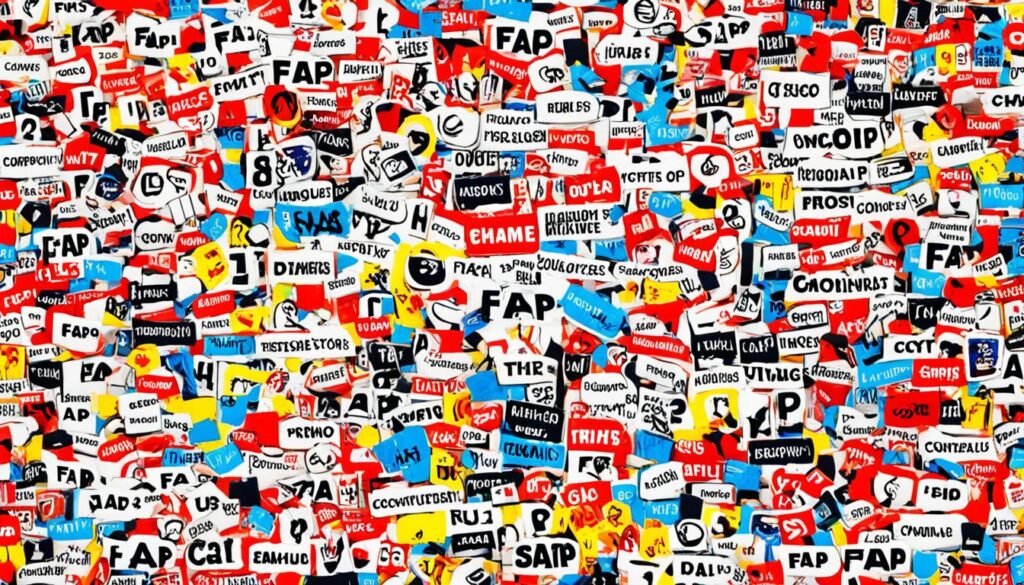Did you know that fap is a slang term commonly used to describe male masturbation? It may seem surprising, but this euphemism has become widespread in online communities, particularly in forums, chat rooms, and social media platforms. Whether you’ve encountered the term before or are completely new to it, this article will delve into the origins, usage, and variations of “fap” to provide a comprehensive understanding of its meaning and cultural significance. Let’s explore the world of fap together.
From its humble beginnings as a representation of a sound to its integration into internet language and meme culture, fap has become an integral part of online communication. But how did this term originate? What are its synonyms and variations? And how does it relate to pornography and the “No Fap” movement? We’ll answer all these questions and more, shedding light on a phenomenon that may be unfamiliar to many but is deeply ingrained in online lingo. So, join us on this informative journey to unravel the meaning and significance of “fap”.
Origins of the Term “Fap”
The term “fap” has an interesting history that can be traced back to the Japanese manga Heartbroken Angels (Kizudarake no Tenshitachi), published from 1988 to 1991. In this manga, “fap” was initially used to represent the sound of a male character masturbating while looking up a girl’s skirt. Although its context was explicit, this term eventually gained popularity in manga and webcomics, extending its influence into broader internet culture.
In 2002, “fap” made its way into the Urban Dictionary, solidifying its place as a well-known term within online slang. Since then, it has become widely recognized and is often associated with male masturbation in various online communities.
Usage of “Fap” in Online Communities
“Fap” has become a common and lighthearted term within online communities. It is frequently used in forums, chat rooms, and social media platforms to humorously or playfully discuss and describe male masturbation. While its usage may raise eyebrows in some circles, it has become an integral part of internet culture and is predominantly seen as a lighthearted expression.
The term has also made its way into different forms of online content, including internet memes and satirical videos. These hilarious and creative adaptations have further highlighted the term’s presence and impact in the online world. In fact, “fap” has even found its way into adult entertainment websites, where it is often referenced in a playful and casual manner.
“Fap” has certainly cemented its place in the online lexicon, bringing laughter and camaraderie to countless digital interactions. Its usage serves as a reminder that online communities thrive on shared experiences, even when they involve taboo subjects.”
In addition to its lighthearted nature, “fap” has also become a catalyst for creative expression. It has given rise to various internet memes and humorous discussions that engage users across different online platforms. These playful conversations and shared experiences contribute to the unique sense of community that online spaces can foster.
While the usage of “fap” may initially seem peculiar or even crass to some, it is essential to recognize its significance within the context of online communities. It serves as a form of self-expression, humor, and a way to connect with others who share similar experiences and interests.
Now let’s dive deeper into the variations and synonyms of the term “fap” in the next section.
Variations and Synonyms of “Fap”
While “fap” is the most widely used term for male masturbation, there are also numerous variations and synonyms that exist. Some common alternatives include:
- Tickling the pickle: This phrase humorously refers to the act of self-pleasure, using the image of “tickling” to describe the action.
- Choking the chicken: This euphemistic phrase uses the imagery of “choking” a chicken to metaphorically represent male masturbation.
- Jerking off: This straightforward term, while less humorous, is widely recognized and commonly used to describe the act of male masturbation.
- Beating the meat: This phrase uses a vivid and somewhat comical image to allude to the act of self-pleasure.
These terms often carry a humorous or euphemistic tone and serve as alternative ways of referring to the act of self-pleasure. They highlight the creativity and playfulness of language when it comes to discussing intimate topics.
In the image above, you can see a visual representation of the various synonyms and alternatives for the term “fap.”
Fap and Pornography
In the early 2000s, “fap” became associated with the world of pornography, particularly online. Adult websites and porn-related discussions often use the term in their content and descriptions. It has become a popular element of porn culture and is frequently mentioned in the context of explicit videos or images. However, it’s important to note that the term is not limited to this context and is used more broadly in online communities.
| Impact of Fap on Porn Culture | Examples |
|---|---|
| Fap is commonly used in the titles and comments of pornographic content, both as a way to attract viewers and to engage in discussions about the content. | Fap Journals, a popular adult website, frequently encourages users to share their fap experiences and preferences. |
| Fap has also been adopted as a category or tag on adult websites, allowing users to easily search for content related to their interests. | Fap category on PornHub provides easy access to a wide range of sexual videos. |
| Fap is sometimes used in the names of adult chat rooms or forums, creating a community for individuals with shared interests. | The Fap Club forum connects users interested in discussing and sharing adult content. |
Fap has become deeply ingrained in the language and culture of online pornography, playing a significant role in how explicit content is presented and discussed. It has become synonymous with the act of self-pleasure in this context, reflecting its widespread acceptance and usage within the online adult entertainment industry.
Inclusive Usage
While “fap” is most commonly associated with pornographic content, it is worth emphasizing that the term is not exclusive to this context. It continues to be used in a broader sense within online communities, where it maintains its lighthearted and casual connotation. It is important to recognize the varied usage and interpretations of the term, as it may differ depending on the context in which it is encountered.
No Fap Movement

The “No Fap” movement is a community of individuals who advocate for abstaining from pornography and masturbation. By refraining from these activities, proponents of the movement believe that various benefits can be achieved. These include improved relationships, increased energy levels, and enhanced focus. The No Fap movement has gained traction, particularly among followers of the manosphere and pick-up artist communities. Members often use the hashtag “#nofap” to share their experiences and provide support to others.
In a society that is increasingly saturated with explicit content, the No Fap movement offers an alternative approach to personal fulfillment and self-discipline. By abstaining from pornography and masturbation, members aim to restore balance, regain control, and redirect their sexual energy towards more productive endeavors. The movement emphasizes the importance of cultivating healthy relationships, building self-confidence, and pursuing personal growth.
While the No Fap movement might be criticized for its associations with certain subcultures, it has also garnered interest and support from individuals across various backgrounds. People from all walks of life have found value in adopting a lifestyle that prioritizes self-control and moderation. The movement serves as a reminder that individuals have the power to shape their own habits and behaviors, ultimately leading to a more fulfilling and balanced life.
Benefits of No Fap
The No Fap movement claims that abstaining from pornography and masturbation can lead to several advantages. Some of the key benefits often cited by its followers include:
- Improved relationships: By channeling sexual energy towards meaningful connections, individuals may experience enhanced intimacy and communication in their personal and romantic relationships.
- Increased energy: The movement purports that by refraining from excessive sexual release, individuals may experience a boost in overall energy levels, resulting in increased motivation and vitality.
- Enhanced focus: Proponents argue that abstaining from pornography and masturbation can contribute to improved mental clarity and concentration, ultimately leading to increased productivity and goal attainment.
- Greater self-discipline: The No Fap movement provides a framework for individuals to develop self-control and discipline, fostering personal growth and the ability to resist immediate gratification.
- Heightened self-awareness: By consciously refraining from pornography and masturbation, individuals may gain deeper insights into their own desires, values, and emotional well-being.
While these benefits are advocated by the No Fap movement, it’s important to note that the scientific evidence supporting these claims is limited and subject to debate. Individual experiences may vary, and it’s crucial to approach the subject with a critical mindset and seek professional advice if necessary.
Fap in Internet Language and Memes
“Fap” has become an integral part of internet culture, finding its place in the realm of online language and memes. It is frequently used in humorous discussions and memes that revolve around sexual topics and online behavior. From satirical YouTube videos providing comedic tutorials on “how to fap” to the creation of parody content like the infamous “Fap to the Future” inspired by the popular film “Back to the Future,” the term has seamlessly integrated into the lexicon of internet lingo.
Online communities have embraced the term “fap,” turning it into a meme that reflects the playful and sometimes risqué nature of internet culture. It has evolved beyond its original meaning and is now used to evoke humor and create comedic effect in various contexts. The versatility of the term allows it to be flexibly employed in a multitude of comedic scenarios, perpetuating its prominence within internet-driven discussions.
The Role of “Fap” in Memes
Memes are an essential part of internet communication, and “fap” has found its way into numerous meme formats. It is often used as a punchline or a key element, relying on the audience’s understanding of its underlying meaning. Memes that incorporate “fap” as a central theme can be found across social media platforms, such as Instagram, Twitter, and Reddit. These memes add a touch of humor and relatability to the online experience, drawing on shared knowledge and experiences within the online community.
“Fap: the meme that keeps on giving. Its usage in online communities ignites laughter and provokes a sense of camaraderie as individuals bond over their shared experiences and humorous anecdotes.”
Rise of “Fap” in Internet Language
The widespread use of “fap” within internet communities has led to its integration into the broader internet language. It has become an instantly recognizable term that captures the essence of online humor and serves as a tool for comedic expression. From casual conversations to online banter, the term has become a staple in the linguistic repertoire of internet users, allowing for playful and light-hearted interactions.
The propagation of “fap” in internet language demonstrates the adaptability of modern communication, as internet-savvy individuals embrace and create their own unique terminology. It further solidifies the prominent role of internet culture in shaping linguistic evolution and the way we communicate in the digital age.
| Meme Example | Explanation and Context |
|---|---|
| This meme features a popular character from a television show reacting with surprise and confusion to the mention of “fap.” The image is often paired with captions that playfully reference the online slang, creating a humorous juxtaposition between the character’s innocence and the term’s risqué connotation. |
Public Perception and Awareness of “Fap”

The term “fap” primarily exists within online communities and may not be widely recognized or understood by the general public. However, among internet-savvy individuals who engage in online forums or social media platforms, its usage is more prevalent.
It is important to note that “fap” is often associated with pornography and explicit content. Therefore, caution should be exercised when using the term in different contexts.
While public perception of “fap” may vary, it is essential to be aware of its connotations and carefully consider its appropriateness in conversations or written communication.
Public Perception
“Fap” is mainly known within online communities, and people who are not active users of these platforms may not be familiar with the term. It’s important to be mindful of the audience and avoid using potentially offensive or explicit language.”
As “fap” is associated with male masturbation, it can be perceived differently by individuals depending on their personal beliefs and values. Some may find it humorous or light-hearted, while others may consider it inappropriate or offensive.
It is crucial to understand the public perception may vary, and using the term “fap” in certain settings could elicit negative reactions or misunderstandings.
Awareness of “Fap”
As the term “fap” originated within online communities, individuals who actively participate in these communities are more likely to be aware of its meaning and usage.
For those who are not regular users of online platforms, “fap” may still be an unfamiliar term. The slang nature of the word, combined with its association with explicit content, restricts its widespread recognition beyond internet communities.
It is important to consider the context and target audience when discussing or writing about “fap” to ensure clear communication and avoid confusion or unintended offense.
Public Perception and Awareness of “Fap”
Below is a table summarizing the public perception and awareness of the term “fap” in various contexts:
| Context | Public Perception | Awareness |
|---|---|---|
| Online Communities | Varies widely; often seen as humorous or light-hearted within these communities. | More prevalent among active users of online forums and social media platforms. |
| General Public | May not be widely recognized or understood. | Unfamiliar to those who are not active users of online platforms. |
Language Variations and Popularity of “Fap”
The term “fap” may have originated in English, but its popularity has transcended language barriers, gaining recognition in various cultures worldwide. In non-English-speaking regions, alternative terms or translations are commonly used to convey the concept of male masturbation or mimic the sound associated with it.
This global reach and influence of internet slang exemplify the interconnectedness of online communities. The term “fap” has become a universal symbol, transcending linguistic boundaries and fostering a shared understanding among internet users around the world.
However, it’s crucial to acknowledge that the level of familiarity and acceptance of the term may differ depending on the cultural context. While some communities may readily embrace and employ “fap” as part of their regular vernacular, others may have limited exposure or a more conservative attitude towards such explicit language.
Language Variations
In different countries and cultures, variations of the term “fap” have emerged to encapsulate the concept of male masturbation. These variations often seek to reproduce the sound or evoke a similar sense of meaning. Here are a few examples:
- Japan: In Japanese, the term “onanii” (オナニー) is commonly used to describe the act of male self-pleasure.
- France: French speakers may refer to male masturbation as “branler” or “se branler,” which translates to “to jerk off” or “to masturbate.”
- Germany: Germans employ the term “wichsen” to signify male self-stimulation.
- Spain: In Spanish, the verb “pajearse” is often used to describe male masturbation.
These examples highlight the linguistic diversity and creativity associated with expressing the concept of male self-pleasure in different cultural contexts.
Popularity of “Fap”
The term “fap” has achieved significant popularity in online communities, particularly within the realm of internet culture. It has become a symbol of collective understanding and humor, transcending geographic and linguistic boundaries. “Fap” is often used playfully and jokingly by internet users to discuss or refer to male masturbation.
“The widespread usage of ‘fap’ in online communities underscores its cultural relevance and acceptance as a widely understood term for male self-pleasure.” – InternetSlangFinder.com
As the internet continues to shape and influence modern language, the term “fap” has cemented its place in the online lexicon. It serves as a unique marker of internet culture and the interconnectedness of diverse communities across the globe.
Conclusion
In conclusion, “fap” is a widely-used slang term that refers to male masturbation. Originating from its association with the sound of this activity, it has gained popularity in online communities. However, it is crucial to understand the context in which the term is used and consider its appropriateness in different settings. While it is well-known among internet-savvy individuals, the general public may not be as familiar with it.
It is important to recognize that “fap” is part of internet slang and is often used in a humorous or casual manner. Within online communities, it serves as a lighthearted way to discuss or joke about male masturbation. Nonetheless, caution should be exercised when using the term, especially in more formal or professional environments.
In summary, “fap” is an online slang term that represents male masturbation and has a unique place in internet culture. While its usage is widespread within certain circles, awareness and acceptance of the term may vary among different individuals and communities. When engaging in online discussions or using the term, it is essential to be mindful of the audience and the context in which it is being used.
FAQ
What does “fap” mean?
“Fap” is a slang term commonly used to refer to male masturbation. It originated from the sound associated with this activity and has become popular in online communities.
Where did the term “fap” come from?
The term “fap” was first introduced in the web comic Sexy Losers in 1999, where it was used to depict the sound of a male character masturbating. It later gained popularity in online communities and was added to Urban Dictionary in 2002.
How is “fap” used in online communities?
“Fap” is often used humorously or playfully in online forums, chat rooms, and social media platforms to discuss or describe male masturbation.
Are there any synonyms for “fap”?
Yes, there are various synonyms for “fap” that carry a similar humorous or euphemistic tone, such as “tickling the pickle,” “choking the chicken,” “jerking off,” and “beating the meat.”
Is “fap” associated with pornography?
“Fap” has become associated with the world of pornography, particularly in online content and discussions. However, it is important to note that the term is used more broadly in online communities.
What is the No Fap movement?
The No Fap movement is a community of individuals who promote abstaining from pornography and masturbation. They believe it can lead to various benefits, such as improved relationships, increased energy, and enhanced focus.
How is “fap” used in internet language and memes?
“Fap” is often referenced humorously in discussions and memes related to sexual topics or online behavior. It has become part of online lingo and meme culture.
Is “fap” widely recognized by the public?
The term “fap” exists primarily within online communities and may not be widely recognized or understood by the general public.
How is “fap” used in different languages and cultures?
In non-English-speaking regions, alternative terms or translations are commonly used to mimic the sound or convey the concept of male masturbation. The familiarity and acceptance of the term may vary depending on the cultural context.






